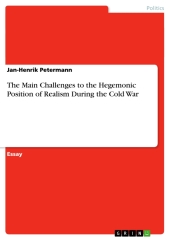 Neuerscheinungen 2011Stand: 2020-01-07 |
Schnellsuche
ISBN/Stichwort/Autor
|
Herderstraße 10
10625 Berlin
Tel.: 030 315 714 16
Fax 030 315 714 14
info@buchspektrum.de |

Jan-Henrik Petermann
The Main Challenges to the Hegemonic Position of Realism During the Cold War
3. Aufl. 2011. 16 S. 210 mm
Verlag/Jahr: GRIN VERLAG 2011
ISBN: 3-656-06230-7 (3656062307)
Neue ISBN: 978-3-656-06230-1 (9783656062301)
Preis und Lieferzeit: Bitte klicken
Essay from the year 2006 in the subject Politics - International Politics - General and Theories, London School of Economics (Department of International Relations), language: English, abstract: Proponents of a īneo(realist)-neo(liberal) consensusī within the academic field of International Relations (IR) hold that, despite the occurrence of numerous intra- and interdisciplinary challenges over the past decades, the core assumptions of realism still constitute a dominant paradigm in the study of world politics. This essay argues that such an overall judgement might be appropriate if it is meant to reflect the long-term adaptability of realist thought - although some qualifications have to be made as to what rival theory has achieved what degree of relative success in questioning realismīs intellectual hegemony.
First, it is striking to note how many elements of the rationalist/positivist epistemology embodied by neorealism have found their way into neoliberal as well as constructivist theories of international politics. The adequacy of realismīs classical formula - international relations is about states pursuing interests defined in terms of power - has been doubted by advocates of interdependency and globalisation. But in the long run, even those accounts seem to have been absorbed by the dominant īneo-neo consensusī. It would certainly be difficult to deny the fact that state preferences and military power continue to be crucial variables in international politics, regardless of the question whether they articulate themselves through direct inter-state relations or in more complex forms of multi-level bargaining.
Second, the ongoing empirical relevance of (neo)realist thought is reflected by the huge influence of state-centric and security-oriented reasoning as it is routinely applied by major policy consultants and think tanks, especially in the US. As a result, it might be safe


